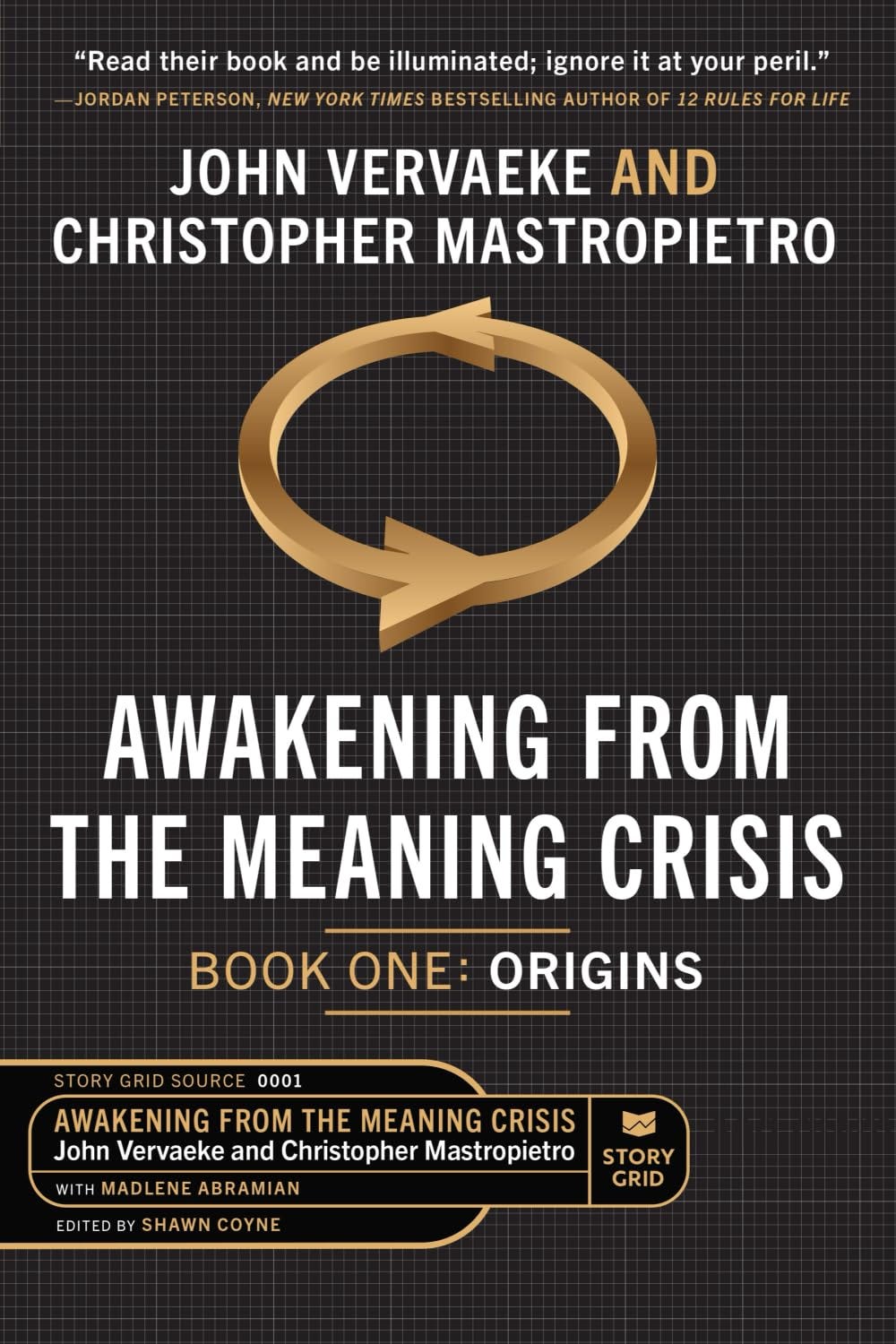👁️ Top Insights #127 - When You Lose This You Suffer, The Deepest Contemplation, & The Biggest Constraint on Human Development
You need this to change, the contemplation I will do until I die, the type of thinking needed for social transformation, KRS-one on God, & sucking before your good.
“Top Insights” is a monthly newsletter that shares mind-expanding podcasts, transformational frameworks, and insightful links that help you go beyond conventional development.
Welcome to the December 2024 Edition of Top Insights 🎄
Wishing you a happy & healthy holiday season.
When You Lose this You Suffer 😱
Most people are propelled into spirituality by the flames of suffering.
I started meditating because I often experienced intense emotions that I had no way to cope with.
After nearly a decade of committed meditation practice, I am far less reactive but there are still times I experience psychological distress.
The best metaphor I have for this experience is a thick fog that fills me with confusion, lostness, and meaninglessness.
If I pay close attention I can see the thickness of the fog change throughout the day.
There are even times when it dissipates momentarily, but generally, it lingers for most of the day.
Of course, this fog is just an amalgam of thoughts, sensations, and emotions.
In the meditation practices I work with we attempt to see the emptiness of experience.
For example, to see the emptiness of a thought is to recognize that it is unfindable yet vividly occurring.
I can know that the thought is appearing but I can’t locate that thought.
I can do the same with emotions and bodily sensations.
In seeing the emptiness of experience, there is freshness, aliveness, and a lack of any fundamental problem.
Usually, this is an effective practice but I’ve noticed that it’s nearly impossible to do once I’ve already become immersed in the fog.
The thing about emptiness practices is you need a baseline level of concentration to do them or what dharma teacher Ken McLeod calls Free Attention.
Ken writes…
“Change by choice becomes possible only when we have free attention, a level of attention that is not completely absorbed by conditioning.”
He continues….
“When an experience absorbs emotional energy, whether the experience is a flower, a thought, a feeling, or a belief, attention goes passive and we are less present with what’s going on. Passive attention is unstable, reactive, and involuntary.”
It’s becoming clear that when I experience psychological distress it’s because my attention has collapsed.
I’ve also come to recognize that no subjective state or unpleasant emotion is truly a problem if we have free attention or spaciousness.
The work for me is continuing to cultivate stability and clarity in my attention while noticing the activities and triggers that dissipate it.
The Deepest Contemplation 💀
They say children can’t truly grasp the concept of death until they’re around seven years old.
But if we’re honest, even most adults don’t fully grasp it.
It’s as if our minds are wired to deny impermanence.
For many, death is understood as a singular, distant event—something that happens far away in the future.
After my big psychedelic experiences, I could no longer see death that way.
Death is no longer separate from life.
Living and dying are two sides of the same coin, like breathing in and breathing out.
Since those initial openings, I’ve found myself meditating on death daily.
Most days, it’s not even intentional; the contemplation arises naturally on its own.
Some of my friends find this strange.
They don’t see how anything positive could come from reflecting on death.
I couldn’t disagree more.
Contemplating death doesn’t leave me feeling depressed—it makes me feel alive.
It’s a bittersweet recognition of the preciousness of everything.
Tears well up in my eyes when I look at my children’s faces, knowing that who they are right now is slipping away with each passing second.
I’m able to love more deeply when I remember that every time I see my parents, it could be the last.
When I feel anger toward my wife, I imagine her on her deathbed, and the anger dissolves.
Problems and worries seem to dissipate when I remember death.
You and I one day will no longer be and yet here we are granted another day.
The Biggest Constraint on Human Development 🔒
The biggest constraints on human development are systems, unsurprisingly they are also the hardest to change.
I ran across this note on substack from Dr. Erica Matluck who speaks to this from the perspective of medicine:
“I worked in conventional medicine for almost a decade before I could confidently say that the conventional medical paradigm itself was the biggest limitation to healing. My patients were suffering and I could see exactly what they needed to heal but the system I was working in did not allow me to offer the appropriate guidance. I broke the rules over and over, pushed back on antiquated ideas and economic driven boundaries, but the more I fought, the more the system exhausted me and the harder it became to share my gifts and do what only I know how to do. Integrity has always been at the forefront of my practice so once it was clear that the conventional medical structure & the standard of care was an obstacle to healing, I had to leave.
Let me clarify that I am in no way ANTI-conventional medicine. I do think there is a time and a place for medication, for surgery, for specialists and even quick fixes. I learned SO much from working in that system and I am forever grateful to the patients, providers & administrators that impacted my experience.
However, a sick system cannot heal people. An imbalanced system cannot restore equilibrium. These days I think a lot about how to heal the system and shift the paradigm from outside the system- where I now practice freely. I am humbled to participate in the kind of healing that inspires me to the core. The healing I witness in my current practice brings me to my knees and reminds me that life is a miracle- and a cauldron of possibility. There is nothing we are incapable of and the beauty of becoming whole can change the system from the inside out.”
We see these same broken systems in politics, science, education, and media—systems fundamentally incapable of supporting the type of development our society so desperately needs.
Zooming out for a moment, a system is a collection of interconnected parts that work together toward a specific purpose, generating patterns of behavior over time.
Systems often produce their own problems because their structures, feedback loops, and underlying goals drive persistent outcomes like poverty, addiction, or environmental damage.
These issues can't be solved by fixing isolated parts—they require understanding the system as a whole.
Systems are nested within systems.
You’re nested within your family and your family is nested within your local community, your local community within a city, and so it is outwards into the larger universe.
The complexity of systems change can be overwhelming, so it’s vital that we put on our oxygen masks first.
When you take care of your mind-body system you can take of your family system.
When things are operating smoothly at home we may find the capacity to intervene on a larger scale.
To change systems we need to feel resourced but we also need to understand Systems Thinking. Thinking in Systems by Donella H. Meadows is a good introduction.
Elevating Consciousness Podcast 🎙
I didn’t release any podcast episodes this past month but I’m looking forward to resuming these conversations in the new year.
If there are any thinkers/teachers or just fascinating humans you would like to see on the show please do respond with your recommendation.
If you’ve been enjoying the show it would be much appreciated if you left a review here.
Insightful Links 🔗
KRS-ONE on his evolving relationship with God - KRS-One might be your favorite rapper’s favorite rapper but he’s also a profoundly deep and spiritually attuned person. In this mind-expanding clip, he explores how his understanding and connection to God has changed throughout his life.
Memento Mori Meditation with Michael Taft - If you want to contemplate death more intentionally this guided meditation from Michael Taft will take you through the dissolution of the elements and into the clear light.
Ira Glass on sucking before becoming good - A powerful clip that speaks to what it takes to become good at our creative pursuits. Sucking is part of the journey.
Resonant Read 📕
Over the years I’ve been greatly impacted by John Vervaeke’s work.
I’m excited to dive into his and Christopher Mastripietro’s new book “Awakening From The Meaning Crisis” which builds on the lecture series of the same name.
You can get it here.
Quintessential Quote ✍️
“Is the natural order of things itself a miracle? How does the dying of someone you love fit into your idea of justice or mercy or compassion? How about when it is someone you don't love? Here is where you find out what you really believe about what life is for, whether it is fair or just or worth the trouble.” - Stephen Jenkinson
Thanks for reading. If you enjoyed this read click the “Subscribe now” button below to subscribe. If you're already a subscriber click the “Share Insighter” button to share with a friend or the “Leave a comment” button to share some thoughts.







Really nice Substack. I dealt with cycles of depression before (mostly) healing that imbalance with psilocyben mushrooms. Often I talked about "the fog" rolling in. Negative thinking, difficult to make decisions even binary ones, ringing in the ears, sleepyness. Clarity of attention through the fog, yes yes yes.
I, too, think about my own death often, almost daily. Powerful duality that helps you appreciate life. Great reflection on systems, great insight from Dr. Matluck. Awesome vid from KRS-One (love me some BDP!). I've learned so much from my mushroom trips, but if I could say only one realization that has opened my eyes it would be
"IT'S EVERYWHERE."
What's everywhere?
"God."
Michael Taft and Stephen Jenkinson, great teachers.
Appreciate the write up Artem.